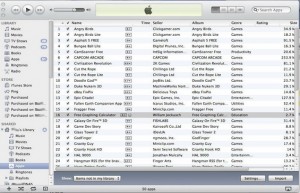 Earlier this week, I heard the new Madonna single "American Life" while I was shopping. I’ve never been a huge Madonna fan, but I liked the hook of the melody. So when I came home, the first thing I did was open my peer-to-peer sharing application, Acquisition. I put the song title into the search window and hit enter, and copies of the mp3 file, ready to be downloaded, appeared in front of me.
Earlier this week, I heard the new Madonna single "American Life" while I was shopping. I’ve never been a huge Madonna fan, but I liked the hook of the melody. So when I came home, the first thing I did was open my peer-to-peer sharing application, Acquisition. I put the song title into the search window and hit enter, and copies of the mp3 file, ready to be downloaded, appeared in front of me.
But then I stopped. With Apple reportedly getting ready to announce an online music service that would enable downloads of music from all of the major music labels, I thought maybe I should try and do the right thing and pay for the song, if it was available somewhere. A quick trip to the Madonna site revealed that the single was available for download on its own for a quick payment through PayPal. I zipped off the $1.49 and in less than a minute, had the song in my iTunes library, ready to be copied onto my iPod.
I hope Apple’s service will be as easy to use and flexible, but some of the circumstances regarding the whole online music scene make me think the folks in Cupertino probably had to make some compromises in order to get everyone to agree. This includes the record executives, who still live in the 1970s when it comes to their business models.
What the record companies don’t get is that the digital revolution has changed the lay of the land forever. The traditional form of music distribution, the album (now the CD), is dead. Compact discs are now just vessels used to transport music to where you really want it, like your computer or mp3 player. One of the things Napster did for us in its brief reign on top of the peer-to-peer sharing landscape was to liberate us from filler songs, those three to five (sometimes more!) songs on an album that aren’t as good as the singles, but are needed to make a complete product that the record companies can sell and make their money from. With illegal downloading from the Internet, we no longer had to listen to those songs. The songs we liked, we kept and put into playlists. The ones we didn’t like went to the trash, never to be heard from again.
So we like to make our mixes and albums. Is there anything wrong with that? It’s not like it’s a new invention. Just remember John Cusack in the movie "High Fidelity," whose character made making a mix of songs from albums and recording them to cassette tapes an art form. "The compilation tape, like breaking up, is hard to do, and it takes ages longer than it might seem," explains Cusack in the movie. Is "Rip, Mix, Burn" any different? Nope.
As Apple gets ready to unveil the service, there are two things to consider. First, it will undoubtedly include some sort of digital rights management restrictions. This is expected. While I don’t necessarily like the technology (just imagine having a book in your library that, after a certain amount of time, glues itself shut so you can’t open it!), I understand that, for now, it is necessary in order to help bring the record companies into the 21st Century.
The second thing is, I hope Apple fought a bit for our rights. With our mp3 players and iPods giving us new levels of freedom in how we play and organize our music, we must have the ability to do what we want with the music. We must be able to have it both on our computer and our separate digital music player of choice. And we must have the ability to burn the songs to CDs, in the order that we want.
We have been liberated from the filler songs and the limitations of the old ways of doing business in the music world, and anything less than these freedoms will guarantee one thing: People will continue to use file-sharing networks to break the law and get the music for free. But if Apple’s tune is right, this could be a major stepping-stone for the company to reach a whole new market, an another avenue for snuffing the criticisms of those who would Macriminate against us.


No comments
Be the first one to leave a comment.